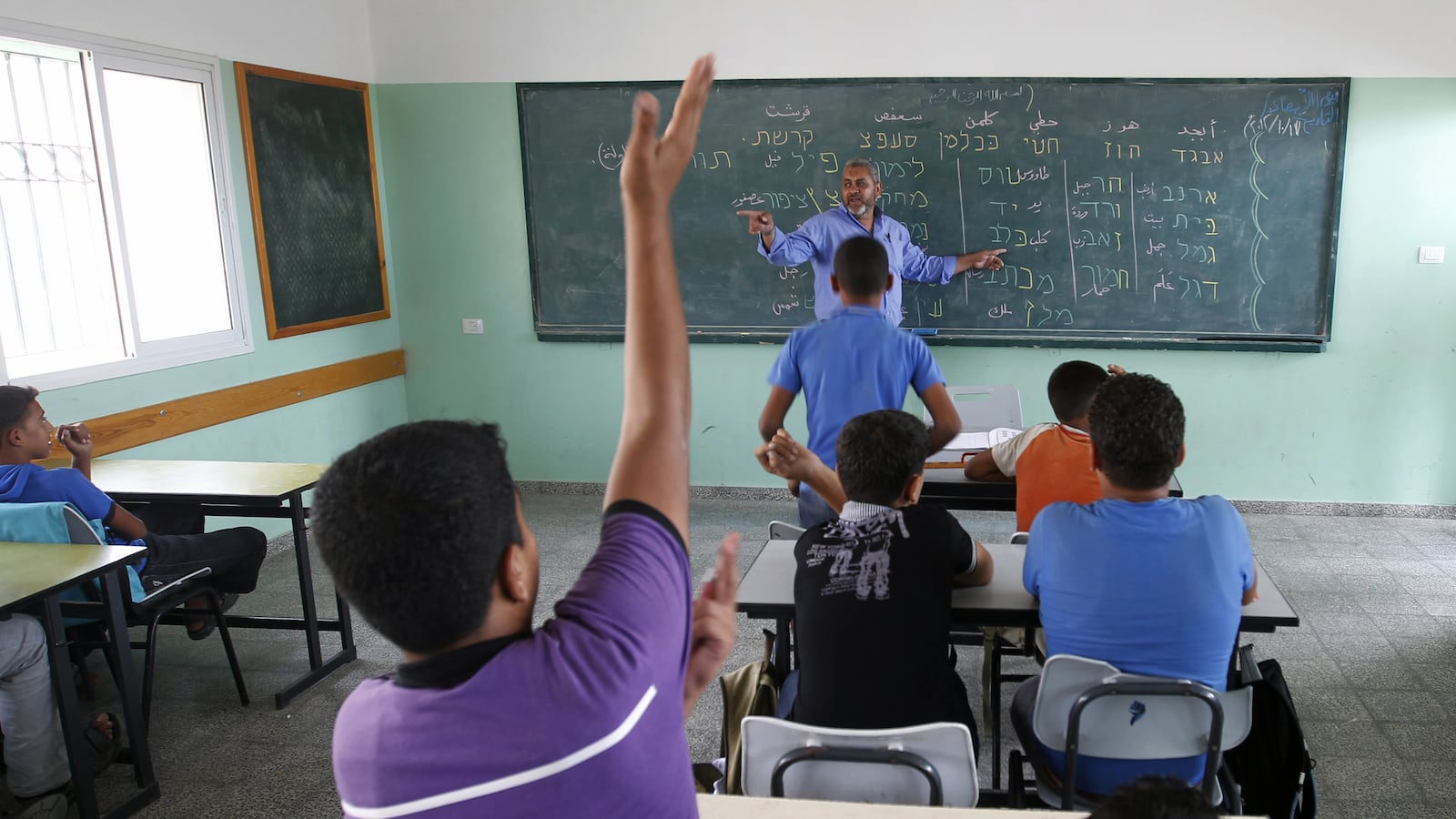To read the results of a new study on Israeli and Palestinian schoolbooks, you’d think the Israeli government would be jumping for joy. The study shows that Israel’s state-approved books are more balanced than their Palestinian counterparts. But it also shows that the Israeli books are not quite as flawless as previously imagined, and that the Palestinian books are not nearly as bad as the Israeli leadership has spent years suggesting. For a government that is wedded to a black-and-white portrayal of Palestinians, even this bit of nuance is unacceptable. While the study has gotten a positive reception from the Palestinian Ministry of Education, the Israeli Ministry has condemned it as “biased, unprofessional and significantly lacking in objectivity.”
The study, which was funded by the U.S. Department of State, led by Israeli professor Daniel Bar-Tal and Palestinian professor Sami Adwan, and overseen by Dr. Bruce Wexler of Yale University, has been examining three systems of textbooks—Israeli state secular, Israeli ultra-Orthodox, and Palestinian—since 2009. It reveals that extreme dehumanizing and demonizing portrayals of the other are very rare in both Israeli and Palestinian schoolbooks. This finding should come as a welcome surprise, especially since dehumanization and demonization feature prominently in the textbooks of other conflict-ridden countries.

The Israeli state books, which are approved by the Israeli Ministry of Education, come off quite a bit better than both the Israeli ultra-Orthodox books and the Palestinian books. While the study shows that all three schoolbook systems present a unilateral national narrative depicting the other community as the enemy, it also shows that these negative features are less pronounced in the Israeli state books: only 49 percent of relevant texts in Israeli state books describe the other in negative or very negative ways, as opposed to 73 percent in Israeli ultra-Orthodox and 84 percent in Palestinian books. The Israeli state books also include more self-critical passages and provide additional information about Palestinian religion, culture, and everyday life.
Reflecting on the causes of this discrepancy, Dr. Wexler said by phone Friday that “the Palestinian books have a more exclusive national narrative and more negative portrayal of the other because, if one of the societies in a conflict is less powerful and suffering more severely, their textbooks are often more strident.”
Why a comparable level of negativity persists in the powerful Israeli ultra-Orthodox sector is less clear. Israel’s ultra-Orthodox schools mostly operate independently and its books are not subject to approval by the Ministry of Education. As a result, problematic features go unchecked. For example, 95 percent of maps in ultra-Orthodox schoolbooks show no borders in the land between the Jordan River and the Mediterranean Sea, implying that the Palestinian areas are part of the State of Israel. What’s more, 25 percent of these maps label the West Bank as Judea and Samaria. The study emphasizes that such features pose an obstacle to peace, because they encourage a maximalist vision of Israel that will make any future agreement based on division of the land more difficult. Wexler admits that the study’s recommendations are “a little vague with regard to what should be done with the ultra-Orthodox community,” even though “the ultra-Orthodox books are more of a problem than the state books.”
The Israeli state system, the clear winner in this study, has been opposed to it from the start. When the research team invited both the Israeli and Palestinian Ministries of Education to learn about the project at its outset, the Israeli Ministry refused to meet. And once the results were released, a Ministry spokesman insisted the study was biased:
The clear impression formed is that it is a “study” with findings that were predetermined even before it was carried out professionally, and it certainly does not reliably reflect reality. The attempt to create a parallel between the Israeli education system and the Palestinian education system is completely unfounded and lacks any basis in reality. The Ministry of Education chose not to cooperate with bodies that wish to slander the Israeli education system and the state of Israel. The results of the “study” reveal that the decision not to cooperate with these bodies was right and justified.
Precisely how the bias is supposed to have crept into this blind study—which was led by Israeli and Palestinian academics from across the political spectrum, and supervised by a scientific advisory panel composed of the most distinguished international experts, including a winner of the prestigious Israel Prize—the Ministry of Education doesn’t say.
“I was very surprised by the Israeli Ministry as an American Jew and very disappointed,” Wexler said. “I certainly didn’t enter this in any way as an adversary of Israel. I’ve had a deep attachment to the State of Israel my whole life. I was applying my scientific background to a problem that they themselves have identified as a very important one.”
But the Israeli Ministry, it seems, felt threatened by the study’s results. “Up until now, the word on the street was just fine for the Israelis: their books were good, the Palestinian books were bad,” Wexler explained. “Look at how frequently Netanyahu makes that point in his speeches. It’s a very common talking point for him.” This new study muddied those waters—not something the Israeli government was interested in.
By contrast, the Palestinians have been positively engaged with the study from the start, even though they knew that the Israeli state books were statistically significantly better. Both the Palestinian leadership and those who have external influence in the Palestinian community have shown a great interest in improving that community’s books. The UK International Development Fund and the UK Foreign Ministry, who have funded the development of Palestinian textbooks, have been eagerly awaiting the results of this study so that they can use them to make the books better—which is to say, more conducive to a culture of peace rather than a culture of conflict.
The ones who are threatening that process, it seems, are the Israeli leaders themselves.






